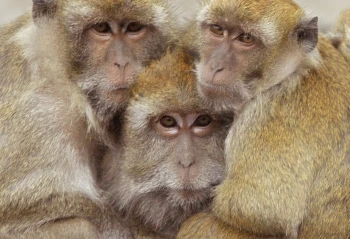Ethology
Ethology is the study of animal behaviour. ‘Behaviour’ includes things such as eating, mating, sleeping and collaboration. Individuals' interactions with their surroundings are determined by their behaviour. This being the case, behaviour is the link between the processes going on between individuals and the rest of the world.
Animal behaviour, and therefore primate behaviour, is observed on the basis of the four questions formulated by Nico Tinbergen. These encompass the four ways in which biological processes can be studied: from the point of view of fitness value (function), the history of evolution (evolution), the way in which behaviour comes about (mechanism) and the development of the individual's behaviour (ontology). We study the social behaviour and social intelligence of primates from these four angles.

How monkeys behave
All diurnal apes and monkeys live in groups featuring a large variety of individuals: young and old, families and outsiders, males and females. They are highly social animals who show off a large variety of social behaviours – behaviours targeted at others. They can be aggressive, but also quite friendly. They will quarrel, but also make up afterwards (reconciliation). In addition, primates recognise members of their own groups and members of other groups, and they maintain different types of social relations, ranging from friendly to neutral or even hostile. It is crucial to the well-being of apes and monkeys that they have the ability to interact with others.
Social skills and intelligence
How does monkeys' social behaviour evolve and develop? And how comparable is their behaviour to human behaviour? Our ethological research largely focuses on the evolution and mechanisms of social behaviour. Individuals may have a conflict of interest, in that members of their own species are both potential rivals and potential allies. Whose favour do you curry, and whom do you consider a rival? You need good social skills to recognise potential friends and rivals, which ability forms the basis for monkeys' intelligence, and therefore for human beings' intelligence.
The focus of our research
It is believed that this social selection pressure played an important part in the evolution of non-human primate intelligence. It is clear that the way in which monkeys express themselves in a social context depends on the animal's personality, its position in the group, its intelligence and the other monkeys' interests. BPRC's researchers observe how monkeys behave in groups and which factors affect their behaviour. Our monkeys live in pseudo-natural groups which mimic the social dynamics of groups living in the wild. Our observations have contributed to the design of BPRC's current social enclosures for the monkeys, and continue to contribute to this day to improvements to and monitoring of the monkeys' living conditions. It goes without saying that our observations do not cause the animals any discomfort.